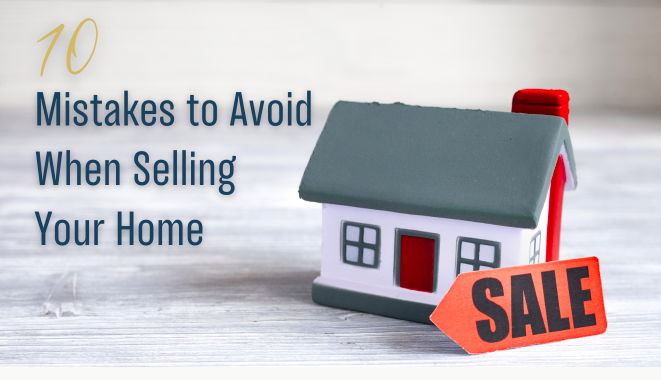
10 Common Mistakes to Avoid When Selling Your Home
Selling a home can be a complex and emotional process. While it’s exciting to move on to a new chapter, small mistakes can cost you time, money, and even potential buyers. To ensure a smooth and successful sale, here are 10 common mistakes to avoid when selling your home.
1. Overpricing Your Home
Why It’s a Problem: Overpricing your home can scare away potential buyers and cause your property to sit on the market for too long. This can lead to price reductions, which may make buyers think there’s something wrong with the property.
How to Avoid It: Work with a real estate agent to conduct a comparative market analysis (CMA). This will help you set a competitive price based on similar homes in your area.
2. Neglecting Repairs and Maintenance
Why It’s a Problem: Buyers are often deterred by visible issues like leaky faucets, cracked walls, or broken appliances. These problems can make your home seem poorly maintained and lead to lower offers.
How to Avoid It: Address minor repairs before listing your home. Consider a pre-listing inspection to identify and fix any issues that could turn buyers away.
3. Using Poor-Quality Photos in Listings
Why It’s a Problem: In today’s digital age, most buyers start their home search online. Blurry, dark, or unflattering photos can make your home look unappealing and reduce interest.
How to Avoid It: Hire a professional photographer to take high-quality, well-lit photos that showcase your home’s best features. Include photos of every room, as well as the exterior and yard.
4. Being Too Emotional During Negotiations
Why It’s a Problem: Selling a home can be emotional, especially if you’ve lived there for many years. Letting emotions drive your decisions can lead to unrealistic expectations or missed opportunities.
How to Avoid It: Approach negotiations objectively. Trust your real estate agent to handle offers and counteroffers professionally, and focus on your long-term goals.
5. Not Staging Your Home Properly
Why It’s a Problem: A cluttered or poorly arranged home can make it difficult for buyers to envision themselves living there. This can reduce the perceived value of your property.
How to Avoid It: Declutter, depersonalize, and rearrange furniture to create a clean, inviting space. Consider hiring a professional stager to highlight your home’s potential.
6. Failing to Market Your Home Effectively
Why It’s a Problem: If your home isn’t marketed well, it may not reach enough potential buyers. Limited exposure can result in fewer offers and a longer time on the market.
How to Avoid It: Use a multi-channel marketing strategy, including online listings, social media, and open houses. Your real estate agent should have a strong marketing plan to attract buyers.
7. Ignoring Curb Appeal
Why It’s a Problem: The exterior of your home is the first thing buyers see. A neglected yard or outdated façade can create a negative first impression.
How to Avoid It: Invest in curb appeal by mowing the lawn, trimming bushes, painting the front door, and adding potted plants or flowers. A welcoming exterior can draw buyers in.
8. Not Disclosing Issues with the Property
Why It’s a Problem: Failing to disclose known issues (e.g., foundation problems, water damage) can lead to legal trouble and derail the sale. Buyers will likely discover these problems during the inspection anyway.
How to Avoid It: Be transparent about any known issues with your home. Provide a seller’s disclosure form and address concerns upfront to build trust with buyers.
9. Being Unprepared for Showings
Why It’s a Problem: A messy or unkempt home can turn off potential buyers. If your home isn’t ready for showings, buyers may assume it hasn’t been well-maintained.
How to Avoid It: Keep your home clean and organized at all times. Make beds, wash dishes, and remove personal items before showings. Consider temporarily relocating pets to make the home more inviting.
10. Ignoring Buyer Feedback
Why It’s a Problem: If multiple buyers provide similar feedback (e.g., the home feels cramped or the price is too high), ignoring it can prolong the selling process.
How to Avoid It: Take buyer feedback seriously and be willing to make adjustments. This could mean lowering the price, making repairs, or improving staging.
Bonus Tip: Choosing the Wrong Real Estate Agent
Why It’s a Problem: An inexperienced or unqualified agent can mishandle negotiations, misprice your home, or fail to market it effectively.
How to Avoid It: Research agents thoroughly. Look for someone with experience in your local market, strong communication skills, and a proven track record of successful sales.
Conclusion
Selling your home doesn’t have to be stressful if you avoid these common mistakes. By pricing your home correctly, making necessary repairs, staging effectively, and working with a trusted real estate agent, you can attract more buyers and secure a great deal. Remember, preparation and attention to detail are key to a successful sale.
Take the time to plan and execute your selling strategy carefully, and you’ll be well on your way to a smooth and profitable transaction.

 February 11, 2025
February 11, 2025



